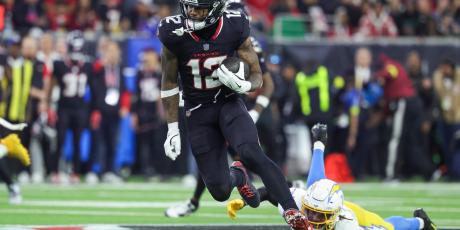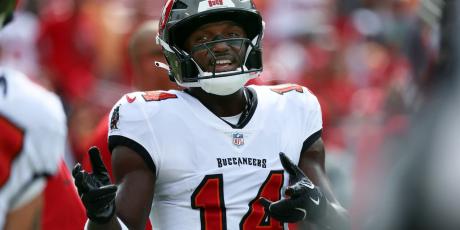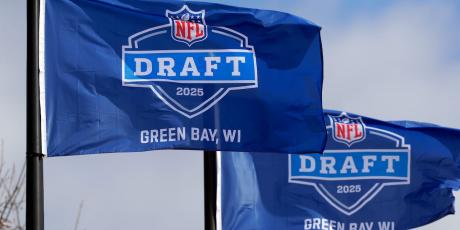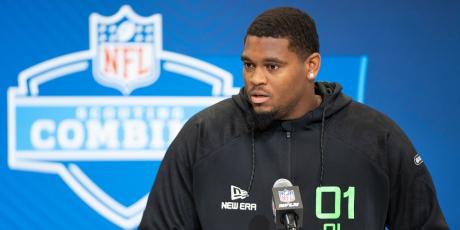Who Are the Most Consistent Fantasy Football Running Backs?

In an effort to identify the most consistent running backs, I’m using the same process as I used in the quarterback study. Utilizing the Coefficient of Variation (CV), which is the ratio of the player’s standard deviation to his per game average, I can calculate his overall consistency.
CV = standard deviation / PPG
Standard deviation measures the amount of variation within a data set, and dividing it by the mean allows us to compare two players with very different levels of production (e.g. LeVeon Bell and Charles Sims).
CV is typically expressed as a percentage, and the lower the CV the more consistent the player.
Below is a table with the top 70 running backs (according to their two-year PPG average in PPR formats), two-year CV and 2015 CV. I excluded Week 17 since teams often rest starters that week and I didn’t want that to throw off our numbers. Otherwise, all regular season games are included, including injury-shortened games since injuries/durability are part of a player’s overall consistency.
| Player Name | Team | 2-YR PPG | PPG RANK | CV | 2015 CV |
|---|---|---|---|---|---|
| Mark Ingram | NO | 15.9 | 10 | 34% | 24% |
| T.J. Yeldon | JAX | 13.0 | 18 | 38% | 38% |
| Arian Foster | HOU | 21.5 | 2 | 38% | 55% |
| Dion Lewis | NE | 17.2 | 6 | 40% | 40% |
| Matt Forte | CHI | 19.5 | 3 | 44% | 42% |
| Jonathan Stewart | CAR | 12.1 | 24 | 44% | 42% |
| LeVeon Bell | PIT | 22.2 | 1 | 45% | 47% |
| LeSean McCoy | BUF | 13.7 | 13 | 45% | 38% |
| Mike Gillislee | BUF | 12.7 | 20 | 47% | 47% |
| Charles Sims | TB | 9.6 | 42 | 48% | 44% |
| Jamaal Charles | KC | 18.4 | 4 | 48% | 38% |
| Giovani Bernard | CIN | 12.7 | 19 | 49% | 40% |
| Justin Forsett | BAL | 14.1 | 12 | 49% | 54% |
| Melvin Gordon | SD | 7.7 | 60 | 50% | 50% |
| Adrian Peterson | MIN | 16.1 | 8 | 51% | 51% |
| DeMarco Murray | PHI | 17.7 | 5 | 51% | 70% |
| Marshawn Lynch | SEA | 16.7 | 7 | 54% | 41% |
| Duke Johnson | CLE | 10.4 | 36 | 55% | 55% |
| Darren McFadden | DAL | 9.8 | 39 | 56% | 47% |
| Todd Gurley | STL | 16.0 | 9 | 56% | 56% |
| Khiry Robinson | NO | 8.0 | 57 | 58% | 46% |
| Chris Ivory | NYJ | 11.7 | 26 | 59% | 53% |
| Lamar Miller | MIA | 14.3 | 11 | 59% | 69% |
| Steven Jackson | NE | 8.9 | 47 | 60% | - |
| Frank Gore | IND | 11.1 | 30 | 60% | 49% |
| Ryan Mathews | PHI | 10.5 | 35 | 60% | 70% |
| Joique Bell | DET | 11.2 | 29 | 60% | 57% |
| Rashad Jennings | NYG | 10.9 | 32 | 61% | 50% |
| Andre Ellington | ARI | 12.1 | 23 | 62% | 69% |
| Ahmad Bradshaw | IND | 12.6 | 21 | 62% | 101% |
| Jeremy Hill | CIN | 11.7 | 25 | 64% | 65% |
| Karlos Williams | BUF | 11.3 | 28 | 65% | 65% |
| Eddie Lacy | GB | 13.6 | 14 | 66% | 81% |
| Darren Sproles | PHI | 9.6 | 41 | 67% | 59% |
| Fred Jackson | SEA | 9.2 | 44 | 67% | 59% |
| Ronnie Hillman | DEN | 10.7 | 34 | 69% | 62% |
| Ameer Abdullah | DET | 7.4 | 65 | 70% | 70% |
| Shane Vereen | NYG | 10.2 | 38 | 72% | 83% |
| Doug Martin | TB | 11.4 | 27 | 72% | 62% |
| Chris Johnson | ARI | 8.5 | 53 | 72% | 77% |
| Theo Riddick | DET | 9.0 | 46 | 72% | 40% |
| Chris Thompson | WAS | 7.6 | 62 | 73% | 76% |
| Alfred Morris | WAS | 8.9 | 48 | 74% | 78% |
| Danny Woodhead | SD | 13.5 | 15 | 76% | 66% |
| Isaiah Crowell | CLE | 8.5 | 54 | 78% | 87% |
| David Johnson | ARI | 13.4 | 16 | 79% | 79% |
| Latavius Murray | OAK | 9.1 | 45 | 82% | 45% |
| Denard Robinson | JAX | 7.7 | 61 | 82% | 94% |
| Pierre Thomas | SF | 9.5 | 43 | 84% | 154% |
| Antonio Andrews | TEN | 6.9 | 67 | 85% | 62% |
| Devonta Freeman | ATL | 13.3 | 17 | 88% | 55% |
| Carlos Hyde | SF | 7.5 | 64 | 91% | 87% |
| C.J. Anderson | DEN | 11.0 | 31 | 92% | 85% |
| Jeremy Langford | CHI | 10.3 | 37 | 94% | 94% |
| DeAngelo Williams | PIT | 12.3 | 22 | 95% | 84% |
| LeGarrette Blount | NE | 8.0 | 56 | 96% | 90% |
| James Starks | GB | 7.8 | 59 | 96% | 82% |
| Branden Oliver | SD | 8.7 | 51 | 97% | 86% |
| Lance Dunbar | DAL | 5.2 | 69 | 101% | 55% |
| Bilal Powell | NYJ | 7.0 | 66 | 102% | 62% |
| Matt Jones | WAS | 8.8 | 50 | 102% | 102% |
| Spencer Ware | KC | 8.7 | 52 | 102% | 102% |
| James White | NE | 8.1 | 55 | 109% | 107% |
| Matt Asiata | MIN | 7.8 | 58 | 112% | 67% |
| Javorius Allen | BAL | 8.9 | 49 | 112% | 112% |
| Tim Hightower | NO | 10.8 | 33 | 113% | 113% |
| Thomas Rawls | SEA | 9.8 | 40 | 121% | 121% |
| Charcandrick West | KC | 7.6 | 63 | 125% | 90% |
| Joseph Randle | DAL | 5.6 | 68 | 125% | 79% |
| Shaun Draughn | CLE | 4.2 | 70 | 154% | 82% |
A few thoughts…
- Productive players tend to be consistent. The top 10 PPG backs all have a CV of 56% or less, and the least consistent top 10 back, Todd Gurley, had a relatively high CV because he didn’t start the season fully healthy. Devonta Freeman falls into a similar category since he didn’t win the job until 2015. His CV was 55% when we only look at 2015.
- No back has been more consistent than Mark Ingram (34%) over the past two seasons.
- Don’t worry about David Johnson, who didn’t play consistent snaps as a rookie due to the presence of Chris Johnson. His CV should drop significantly this year as he assumes the RB1 role.
- Generally, pass-catching backs tend to be more consistent since receptions are easier to get than touchdowns, which is something that non pass-catching backs have to rely on to score fantasy points. Still, we can divvy the pass-catching group into the consistent (Dion Lewis, Matt Forte, Charles Sims, LeVeon Bell, Giovani Bernard) and the inconsistent (Bilal Powell, Danny Woodhead, Darren Sproles, Shane Vereen, Theo Riddick). Though it should be noted that Riddick was particularly consistent (40%) in 2015.
- On the flip side, Jonathan Stewart and Adrian Peterson do not catch many passes, but they’re relatively consistent due to their regular workloads.
- Eddie Lacy was all over the place (81%) in 2015, but when we look at 2014 only, he posted a relatively consistent CV of 48%. With this reported weight loss, I’m expecting a return to form in 2016.
- I believe C.J. Anderson will become more consistent in 2016, provided he can stay healthy. He hasn’t put together a full season but has shown that he can be an elite RB1 in stretches over the past two seasons.
- Thomas Rawls’ CV should drop below 60% as he takes over for Marshawn Lynch and begins to see a more consistent workload.
Season-long owners in regular formats will want to favor more consistent players, while a higher CV may actually be more desirable in deep best ball formats since you can cash in on the big games without being hurt by the duds. In DFS, higher CVs are better for big contests while consistent backs are more appropriate for cash games.






















